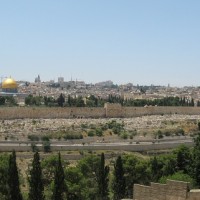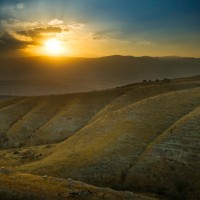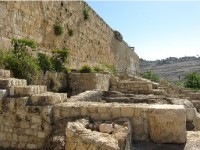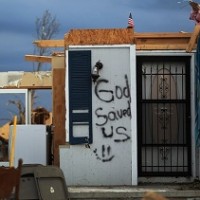A song of ascents. Of David. I rejoiced with those who said to me, “Let us go to the house of the LORD.” Our feet are standing in your gates, O Jerusalem. Jerusalem is built like a city that is closely compacted together. That is where the tribes go up, the tribes of the LORD, to praise the name of the LORD according to the statute given to Israel. There the thrones for judgment stand, the thrones of the house of David. Pray for the peace of Jerusalem: “May those who love you be secure. May there be peace within your walls and security within your citadels.” For the sake of my brothers and friends, I will say, “Peace be within you.” For the sake of the house of the LORD our God, I will seek your prosperity. (Psalm 122:1-9)
Jerusalem—the meaning of this city’s name is remarkable: “habitation of peace.”
Yet in our present day, this “habitation of peace” has shown itself to be a city divided on both religious and political grounds. The Old City has four unequal quarters inhabited by Armenians, Christians, Jews, and Muslims, all claiming Jerusalem by religious authority. This is a city whose internal hostilities mark it as a place of unrest, not peace. It is a city with a biblical history dating back to the record of Abraham and Melchizedek the king of Salem (shalom, peace) in Genesis 14:18-20. Whatever name was given to this City of Peace, sadly it has not lived up to its etymology even to the present day.
Why is that? The Bible records Jesus’ explanation of the unrest which would arise after His final journey to Jerusalem:
As he approached Jerusalem and saw the city, he wept over it and said, ‘If you, even you, had only known on this day what would bring you peace– but now it is hidden from your eyes. The days will come upon you when your enemies will build an embankment against you and encircle you and hem you in on every side. They will dash you to the ground, you and the children within your walls. They will not leave one stone on another, because you did not recognize the time of God’s coming to you’ (Luke 19:41-44).
Jesus and the psalmist agree–the thing that will bring us unifying peace is the presence of God. This is applied to our Lord Jesus Christ in Ephesians 2:13-16:
“But now in Christ Jesus you who once were far away have been brought near through the blood of Christ. For he himself is our peace, who has made the two one and has destroyed the barrier, the dividing wall of hostility, by abolishing in his flesh the law with its commandments and regulations. His purpose was to create in himself one new man out of the two, thus making peace, and in this one body to reconcile both of them to God through the cross, by which he put to death their hostility.”
The writer of our third Song of Ascents joyfully focuses the Jewish pilgrim’s hopes forward to that day by emphasizing:
- The presence of God (as the house of the Lord)
- The unity inspired by worship of Him (as seen in the words us, our, the tribes of the Lord) and
- The peace of Jerusalem.
The psalmist rightly connects all three as inseparable. Only God’s coming to establish Jerusalem as God’s holy city (which is by definition a city completely redeemed from sin) will accomplish this kind of unity and lasting peace. Discipleship Lesson #3 might be called: Seek God’s Presence and Know Peace.
For further meditation:
How does the New Jerusalem of Revelation 21:1-14 look with respect to the presence, worship, and peace of God?




 For the disciple experiencing fatigue, rejection, disappointment, or suffering, there is no greater source of encouragement than knowing that God is watching over you and goes with you. He’s watching over your safety and providing for you.
For the disciple experiencing fatigue, rejection, disappointment, or suffering, there is no greater source of encouragement than knowing that God is watching over you and goes with you. He’s watching over your safety and providing for you. The Samaritans didn’t like the Jews very much. They especially didn’t like them when they were heading to Jerusalem for the feasts. Samaritans believed the presence of God was at Mount Gerizim, not in Jerusalem and the Jewish insistence otherwise by these pilgrims showing up made the Samaritans angry.
The Samaritans didn’t like the Jews very much. They especially didn’t like them when they were heading to Jerusalem for the feasts. Samaritans believed the presence of God was at Mount Gerizim, not in Jerusalem and the Jewish insistence otherwise by these pilgrims showing up made the Samaritans angry. When I was in elementary school, we had music class and would sing songs. Isn’t it interesting how a song from decades ago can still be memorable? One song popped into my head instantly as I was thinking of pilgrims singing on their journey: The Happy Wanderer. The lyrics went, “I love to go a-wandering, along the mountain track. And as I go, I love to sing. My knapsack on my back.” The chorus was always our favorite: “Val-deri,Val-dera,Val-deri,Val-dera-ha-ha-ha-ha-ha.” We especially liked the ha-ha part and sang it with gusto even if the words were total gibberish.
When I was in elementary school, we had music class and would sing songs. Isn’t it interesting how a song from decades ago can still be memorable? One song popped into my head instantly as I was thinking of pilgrims singing on their journey: The Happy Wanderer. The lyrics went, “I love to go a-wandering, along the mountain track. And as I go, I love to sing. My knapsack on my back.” The chorus was always our favorite: “Val-deri,Val-dera,Val-deri,Val-dera-ha-ha-ha-ha-ha.” We especially liked the ha-ha part and sang it with gusto even if the words were total gibberish. The discipleship lessons taught by these Songs of Ascents were well remembered, too. Psalm 120 is the first Song of Ascents and might be titled, “Discipleship Lesson 1: Expect Opposition.” Not exactly The Happy Wanderer as a subject for Psalm 120. So why start here?
The discipleship lessons taught by these Songs of Ascents were well remembered, too. Psalm 120 is the first Song of Ascents and might be titled, “Discipleship Lesson 1: Expect Opposition.” Not exactly The Happy Wanderer as a subject for Psalm 120. So why start here?

 Offering sacrifices to God as a spiritual act of worship: Isn’t that the function of a priest in Old Testament language here in the New Testament? Doesn’t Scripture say that our bodies are the Temple of God (1 Corinthians 3:16)? By His Spirit dwelling in us, aren’t our bodies the place where God meets with us? If yes and Amen and Amen, then doesn’t it follow that when we serve God with our bodies as a spiritual act of worship, we are performing the function of a priest?
Offering sacrifices to God as a spiritual act of worship: Isn’t that the function of a priest in Old Testament language here in the New Testament? Doesn’t Scripture say that our bodies are the Temple of God (1 Corinthians 3:16)? By His Spirit dwelling in us, aren’t our bodies the place where God meets with us? If yes and Amen and Amen, then doesn’t it follow that when we serve God with our bodies as a spiritual act of worship, we are performing the function of a priest? I remember two instances in which the concept of pastor/priest hit home. The first one was when I was speaking with an individual who held a significant administration position in our community. He is Jewish and when he heard that I was in seminary, he asked if when I got out, I’d end up wearing one of those little white collars. We both laughed at the thought and I said that my denomination of church doesn’t do the little white collars…for that matter, women don’t do that kind of service. Then he asked, “Why go through with it then?” I responded, “I really don’t know. I guess, just because God is sending me.” Later on I thought, it doesn’t have to make sense to me. It’s not my role to pass judgment on God’s commission. My role is to do it.
I remember two instances in which the concept of pastor/priest hit home. The first one was when I was speaking with an individual who held a significant administration position in our community. He is Jewish and when he heard that I was in seminary, he asked if when I got out, I’d end up wearing one of those little white collars. We both laughed at the thought and I said that my denomination of church doesn’t do the little white collars…for that matter, women don’t do that kind of service. Then he asked, “Why go through with it then?” I responded, “I really don’t know. I guess, just because God is sending me.” Later on I thought, it doesn’t have to make sense to me. It’s not my role to pass judgment on God’s commission. My role is to do it.